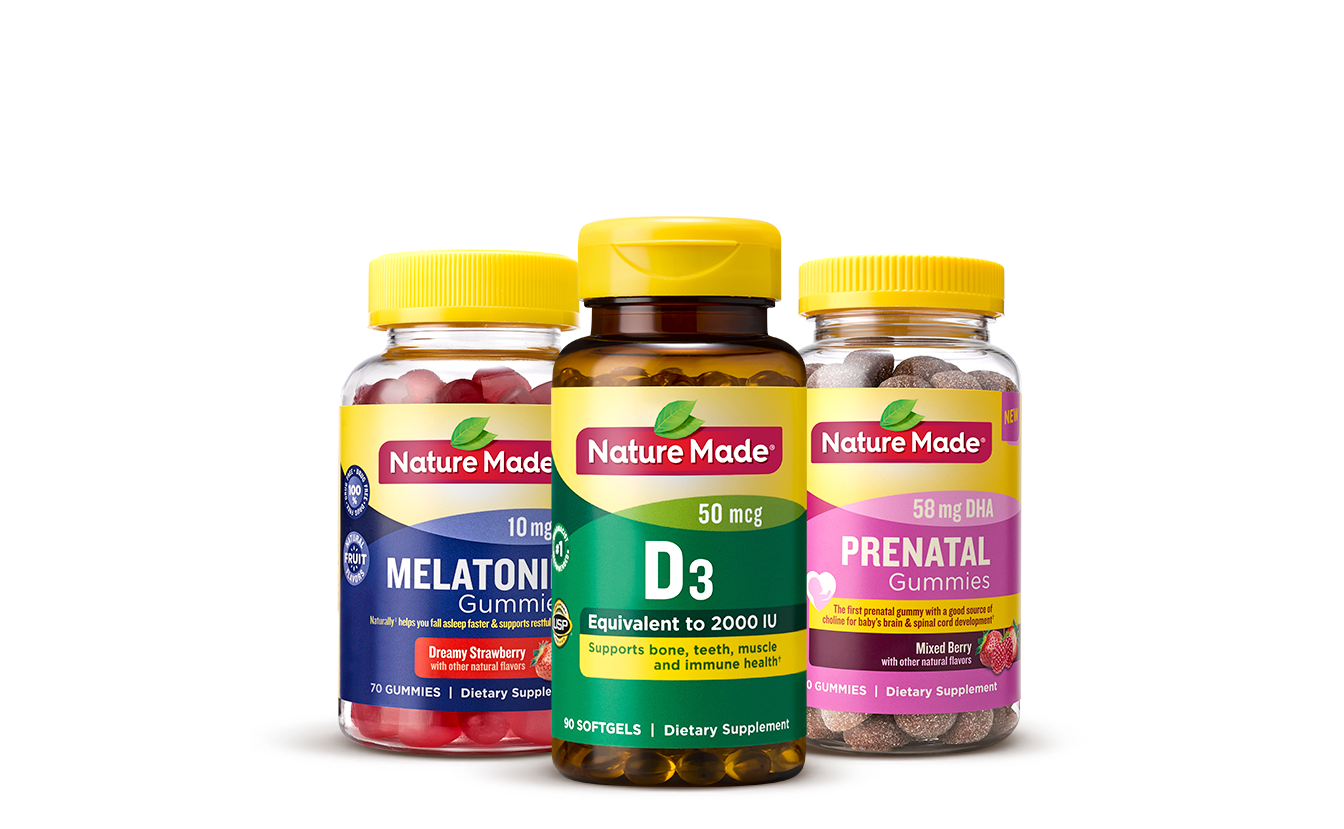What is vitamin D?
Vitamin D is a fat-soluble vitamin that has emerged as a popular nutrient over the past decade. Discovered in the early 1900s as an anti-rickets compound and consequently added to several food sources (e.g. dairy) through mandatory U.S. fortification programs in the 1930s, vitamin D has long been considered a key vitamin essential for overall health.1
Why is vitamin D important?
Bone health support: Vitamin D helps build and support strong bones by enhancing calcium absorption, regulating calcium and phosphorus concentrations in the body, and regulating the bone cells involved in bone remodeling.2-3,†
Muscle health support: Vitamin D is important for muscle health because it supports muscle function, muscle strength, and balance.4,†
Immune health support: Receptors for vitamin D are found in most immune cells. Research suggests that vitamin D may improve natural immune function and inhibit the immune system from attacking healthy cells.5,†
Is vitamin D deficiency a growing problem?
Unfortunately, yes. Too many Americans are not getting enough of this important nutrient. The 2015 USDA Dietary Guidelines for Americans Committee identified vitamin D as a “nutrient of public health concern,” as 9 out of 10 Americans fail to meet their daily vitamin D needs.6 Many Americans don't meet the minimum requirement of sun exposure of 5 to 30 minutes a day/two times a week. Vitamin D deficiency is even more pronounced among people living in northern parts of the country, such as Seattle and New England, especially in the winter due to limited access to sunlight. Although rare, recent evidence has indicated a reemergence of vitamin D deficient rickets and an alarming prevalence of vitamin D insufficiency in particular segments of the population, including those with darker skin pigmentation, the elderly, obese individuals, and those living in geographical areas with limited sunlight.
Are you at risk for vitamin D insufficiency or deficiency?
You may be at risk if you:
- Do not take a daily multivitamin with vitamin D and/or a vitamin D supplement
- Do not make vitamin D in your skin from UVB rays as efficiently (such as older adults and darker-skinned individuals)
- Have an increased need for vitamin D (overweight or obese individuals, older adults)
- Limit sun exposure by wearing sunscreen, are restricted to indoor activity, live at higher latitude or in a region with a long winter season or air pollution
- Have a malabsorption syndrome, liver disease, or renal disease
- Take medications that interact with vitamin D absorption or metabolism
What are the best sources of vitamin D?
For most Americans, sunlight provides the main source of our vitamin D requirements. Few foods naturally contain vitamin D, but those that do include certain fatty fish (such as salmon, mackerel, and sardines), fish liver oils, and egg yolks. To prevent rickets, the US began fortifying dairy and cereal with vitamin D in the early 20th century. Unfortunately, you have to consume large amounts of these natural or fortified food sources to meet your vitamin D needs. For example, one tablet or softgel of Nature Made Vitamin D3 25 mcg (1,000 IU) is equivalent to:
- 7 cans of tuna (3 oz cans)
- 8 cups of fortified milk
- 25 egg of yolks
- 25 cups of fortified cereal7
What is the difference between vitamin D2 and vitamin D3?
Vitamin D is available in two forms: vitamin D2 (plant-derived) and vitamin D3 (animal derived). Vitamin D3 is the preferred form because it has been shown to be more effective than vitamin D2 at raising and maintaining vitamin D levels in your body.8 Vitamin D3 is the form most commonly found in nutritional supplements; the D2 form is mostly found as a prescription.
How much vitamin D is right for me?
There is much debate as to the appropriate level of vitamin D to recommend. Studies continue to emerge in various geographical regions, physiological states, and ethnic minorities and using varying dosages of vitamin D. The Institute of Medicine recommends 15 to 20 mcg (600 - 800 IU) of vitamin D daily to support bone health.9,† The Endocrine Society has also released clinical guidelines that are routinely used by health care practitioners who are working with patients to raise their blood levels of vitamin D. These guidelines recommend 37.5 - 50 mcg (1500 - 2000 IU) vitamin D daily for adults to support consistent blood levels of vitamin D and help those with inadequate vitamin D intake meet their daily nutrient needs.10
To determine how much vitamin D you should supplement, your doctor or healthcare provider can perform a simple blood test (serum 25-hydroxyvitamin D) to check your blood vitamin D level. To correct deficiency, the Endocrine Society recommends 150 mcg (6000 IU) vitamin D daily for 8 weeks.10 However, we recommend that you talk to your doctor to determine the appropriate supplement amount that is right for you.
Be proactive with your health and consider taking a vitamin D supplement as part of a healthy supplement regimen.



